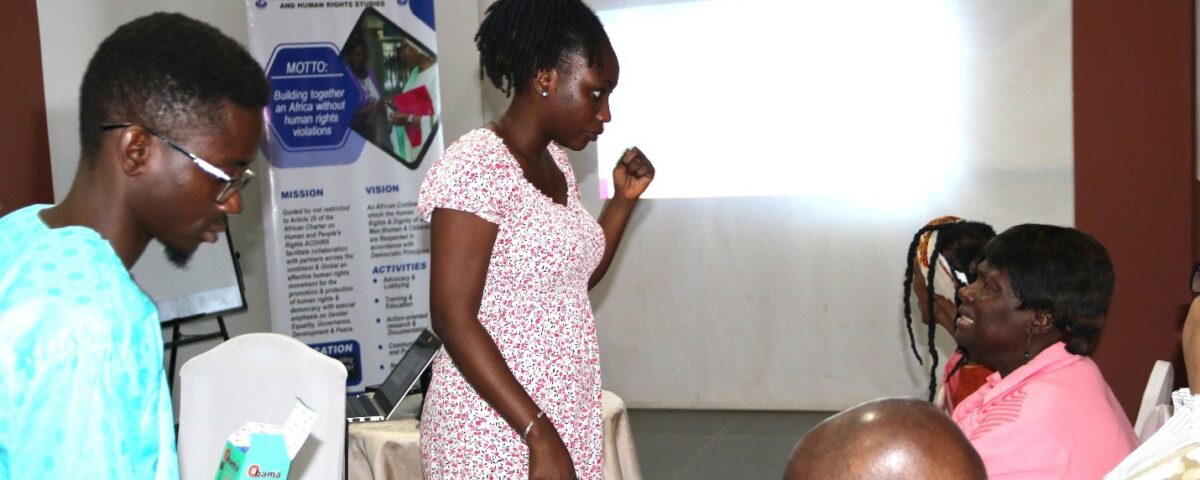
The ACHPR NGOs Forum Steering Committee Meeting, held from July 25-26, 2025, in Banjul, The Gambia, served as a critical platform for shaping the aspirations, challenges, and strategic directions of human rights advocacy across Africa. This pivotal gathering underpins the work of the African Commission on Human and Peoples’ Rights (ACHPR), the African Union’s foundational organ for promoting and protecting human rights across the continent.
The NGOs Forum Secretariat, a vital operational arm, is proudly hosted by the African Centre for Democracy and Human Rights Studies (ACDHRS) and expertly led by its Executive Director, Mrs. Hannah Forster. This year’s meeting saw robust participation from key regional representatives, underscoring the Forum’s diverse and Pan-African leadership. Attendees included:
- Mr. Naji Moulay Lahsen (North Africa Representative, Director, Network of the Independent Commission for Human Rights – CIDH AFRICA)
- Mr. Abdelbagi JIBRIL (Diaspora Representative, Sudan Knowledge Centre)
- Mrs. Corlett Letlojane (Southern Africa Representative, HURISA)
- Mrs. Ninkpib Damba SONHAYE epse KOMBATE (West Africa Representative, ROADDH/WAHRDN)
- Mr. Sadikh NIASS (ACDHRS Advisor)
- Mr. Emílio José Manuel (Lusophone Africa Representative, Plataforma Lusófona dos Direitos Humanos – PLUDH)
- Mrs. Mary de Pais (African Initiative of Women Human Rights Defenders – WHRD Initiative)
Mr. John GBENAGNON, RFLD Senior Officer in charge of Partnership, Resource Mobilization Office – Sub-Saharan Africa, expertly facilitated the two-day meeting. His guidance was instrumental in steering extensive discussions, ensuring all voices were heard, and facilitating the collaborative finalization of strategic directions and governance policies.
The Forum’s overarching goals for 2026-2031 are clear: to reinforce the ACHPR, deepen understanding of the African Human Rights System, amplify human rights advocacy and awareness, and bolster the ACHPR’s independence to better protect Human Rights Defenders (HRDs).
Key strategies to achieve these goals include:
- Strengthening the capacity of Civil Society Organizations (CSOs) and media.
- Enabling greater CSO participation in AU structures.
- Creating dialogue mechanisms with state actors.
- Fostering collaborative platforms and enhancing coalition-building.

A critical priority across all regions is the collective inclusion and advocacy for Youth Representatives, Women Representatives, Sexual Minority Representatives, Disabled Persons Representatives, Refugees, Indigenous Groups, Girls, and Elderly Representatives. This ensures a truly comprehensive and inclusive human rights agenda that leaves no one behind.
The NGOs Forum distinguishes itself through several key attributes:
- Democratic Space for Collective Action: It provides a vital forum for collaborative efforts.
- Strategic Platform: It enables CSOs to effectively engage with the African Human Rights System.
- Pan-African Open Space: It fosters connections among grassroots movements.
- Inclusive Participation: Its criteria ensure broad representation.
- Vibrant and Diverse Nature: It brings together a wide array of perspectives.
- Advocacy Powerhouse: It serves as a strong platform for human rights advocacy.
- Zero-Discrimination Policy: It upholds principles of equality.
- Largest Bi-Annual Gathering: It is the continent’s largest regular convening for African CSOs to share information.
Discussions across various groups highlighted interconnected priorities and challenges. Recurring themes included the critical need for improved communication (both vertical and horizontal) and enhanced visibility for the Forum, alongside fostering greater NGO participation and engagement. Capacity building emerged as a vital area, encompassing general NGO strengthening and specific training for focal points.
Resource mobilization and fundraising were consistently emphasized, with calls for exploring diverse funding streams, including African foundations, and addressing existing financial restrictions. Participants also flagged significant emergent challenges, such as:
- The rise of extremism.
- Online surveillance.
- Lack of ACHPR mechanisms visibility at the local level.
- The plight of marginalized and vulnerable groups.

The discussions underscored the importance of strengthening governance and accountability to hold governments responsible, making the Forum appealing to young people, and leveraging its role to analyze restricted civic space and address issues like climate change, social justice, and business and human rights.
The ACHPR NGOs Forum identifies distinct yet interconnected priorities across diverse regions:
- North Africa emphasizes robust communication to enhance the Forum’s visibility and NGO participation, fostering greater commitment and engagement, and securing fundraising for NGO involvement.
- Central Africa focuses on strengthening NGO capacity, establishing protection mechanisms, providing fundraising support, ensuring the secretariat’s operationalization, learning from UN Human Rights Mechanisms, and collaborating effectively with state actors.
- West Africa prioritizes strong partnerships between National Human Rights Institutions (NHRIs) and NGOs, sustained advocacy, consistent fundraising, and annual capacity building for its focal points.
- Southern Africa highlights the adoption of innovative approaches, regular regional visits by the secretariat, organizing impactful side events, leveraging the Forum’s inherent strengths, and ensuring strong intersection with AU Regional Economic Commitments and AU organs.
- The Diaspora’s focus extends to the international aspect of human rights, particularly engaging with the UN Human Rights System, and providing crucial support for African NGOs and African descendants.
The understanding that what works in one region might not be directly transferable to another—due to differing legal systems, political sensitivities, or cultural norms—is paramount. Therefore, this meeting provided a crucial platform for contextualizing the strategy, allowing participants to offer specific, actionable recommendations that resonate deeply and make goals more attainable within their unique operational environments.
In conclusion, the discussions, debates, and decisions made within the confines of this meeting directly shape the trajectory of human rights advocacy on the continent for the next five years, making it an indispensable forum for progress and change.


